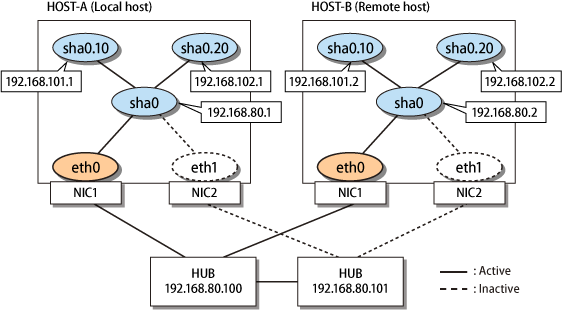This section describes an example configuration procedure of the network shown in the diagram below.
For the network configuration other than GLS, refer to "3.2.2 Network configuration".

[HOST-A]
1) Setting up the system
1-1) Define IP addresses and hostnames in /etc/hosts file.
192.168.80.1 hosta # HOST-A Virtual IP 192.168.101.1 hosta-v1 # HOST-A Virtual IP (Tagged VLAN interface) 192.168.102.1 hosta-v2 # HOST-A Virtual IP (Tagged VLAN interface) 192.168.80.2 hostb # HOST-B Virtual IP 192.168.101.2 hostb-v1 # HOST-B Virtual IP (Tagged VLAN interface) 192.168.102.2 hostb-v2 # HOST-B Virtual IP (Tagged VLAN interface) 192.168.80.100 swhub1 # Primary HUB IP 192.168.80.101 swhub2 # Secondary HUB IP |
1-2) Edit /etc/sysconfig/network-scripts/ifcfg-ethX (X is 0,1) file as follows.
Contents of /etc/sysconfig/network-scripts/ifcfg-eth0
DEVICE=eth0 BOOTPROTO=static HWADDR=XX:XX:XX:XX:XX:XX HOTPLUG=no ONBOOT=yes DEVICETYPE=hanet |
Contents of /etc/sysconfig/network-scripts/ifcfg-eth1
DEVICE=eth1 BOOTPROTO=static HWADDR=XX:XX:XX:XX:XX:XX HOTPLUG=no ONBOOT=yes DEVICETYPE=hanet |
1-3) Define a statement to enable the network and the tagged VLAN in /etc/sysconfig/network file.
NETWORKING=yes VLAN=yes |
2) Creating a virtual interface
/opt/FJSVhanet/usr/sbin/hanetconfig create -n sha0 -m v -t eth0,eth1
3) Setting an IP address and a subnet mask
Define an IP address or a subnet mask in /etc/sysconfig/network-scripts/ifcfg-sha0 file.
Contents of /etc/sysconfig/network-scripts/ifcfg-sha0
DEVICE=sha0 IPADDR=192.168.80.1 NETMASK=255.255.255.0 BOOTPROTO=static ONBOOT=yes DEVICETYPE=sha HOTPLUG=no |
4) Setting the network monitoring function
/opt/FJSVhanet/usr/sbin/hanetpathmon target -n sha0 -p 192.168.80.100,192.168.80.101
5) Adding tagged VLAN interfaces
To add tagged VLAN interfaces (sha0.10 and sha0.20) on the virtual interface (sha0), add the following interface setting files:
Contents of /etc/sysconfig/network-scripts/ifcfg-sha0.10
DEVICE=sha0.10 IPADDR=192.168.101.1 NETMASK=255.255.255.0 BOOTPROTO=static ONBOOT=yes DEVICETYPE=sha |
Contents of /etc/sysconfig/network-scripts/ifcfg-sha0.20
DEVICE=sha0.20 IPADDR=192.168.102.1 NETMASK=255.255.255.0 BOOTPROTO=static ONBOOT=yes DEVICETYPE=sha |
6) Reboot
Run the following command to reboot the system.
/sbin/shutdown -r now
[HOST-B]
1) Setting up the system
1-1) Define IP addresses and hostnames in /etc/hosts file. Defined content is same as HOST-A.
1-2) Edit the /etc/sysconfig/network-scripts/ifcfg-ethX (X is 0,1) file. Defined content is same as HOST-A other than the value of HWADDR.
1-3) Define a statement to enable the network and the tagged VLAN in /etc/sysconfig/network file. Defined content is same as HOST-A.
2) Creating a virtual interface
/opt/FJSVhanet/usr/sbin/hanetconfig create -n sha0 -m v -t eth0,eth1
3) Setting an IP address and a subnet mask
Define an IP address or a subnet mask in /etc/sysconfig/network-scripts/ifcfg-sha0 file.
Contents of /etc/sysconfig/network-scripts/ifcfg-sha0
DEVICE=sha0 IPADDR=192.168.80.2 NETMASK=255.255.255.0 BOOTPROTO=static ONBOOT=yes DEVICETYPE=sha HOTPLUG=no |
4) Setting the network monitoring function
/opt/FJSVhanet/usr/sbin/hanetpathmon target -n sha0 -p 192.168.80.100,192.168.80.101
5) Adding tagged VLAN interfaces
To add tagged VLAN interfaces (sha0.10 and sha0.20) on the virtual interface (sha0), add the following interface setting files:
Contents of /etc/sysconfig/network-scripts/ifcfg-sha0.10
DEVICE=sha0.10 IPADDR=192.168.101.2 NETMASK=255.255.255.0 BOOTPROTO=static ONBOOT=yes DEVICETYPE=sha |
Contents of /etc/sysconfig/network-scripts/ifcfg-sha0.20
DEVICE=sha0.20 IPADDR=192.168.102.2 NETMASK=255.255.255.0 BOOTPROTO=static ONBOOT=yes DEVICETYPE=sha |
6) Reboot
Run the following command to reboot the system.
/sbin/shutdown -r now